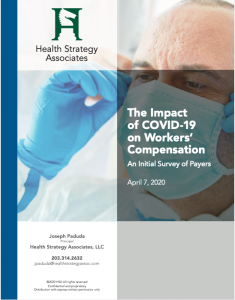Monday I finished a survey of 16 payers, getting their views and perspectives on a variety of COVID-related issues germane to workers’ compensation. The genesis for the survey was several conversations I had with work comp execs two weeks ago; all were struggling to figure out what the impact would be, how to adapt their organizations to deal with COVID, how to set priorities and a host of other questions.
It became apparent that some were much further along in one area and hadn’t thought of other issues. Ideally the survey will help us learn from each other, accelerate adoption of approaches/policies/ideas that work, and shorten the learning curve.

Here are the top takeaways; note that only respondents receive the detailed survey report.
- Claim volumes have dropped about 25% on average, with very different decreases depending on the type of employer involved.
- Tele-medicine in all its versions is exploding as employers seek ways to continue current claimants’ treatment and triage new claims quickly.
- Unlike injuries, respondents’ take is the vast majority of COVID claims will resolve quickly, with most patients recovering with minimal need for care.
- However, there’s a growing concern that some patients may have lasting lung damage and other trauma as well as potential cognitive deficits. This could trigger a whole host of future issues and complications.
A couple more complicated findings bear discussion.
Illness v Injury
Several respondents noted that the industry is struggling to shift from injury-caused claims to disease-caused claims. Historically the vast majority of claims have been injuries – trauma, repetitive motion, burns, slip-and-falls and the like. These are (mostly) relatively straightforward to investigate.
Not so with disease. Where did the exposure occur? Could the patient have been exposed outside the workplace? What do the state laws and regulations say? Where is the burden of proof; claimant or employer, and what constitutes “proof” of occupational exposure?
Needless to say, this is a dynamic situation that’s going to evolve over time.
Which brings up point two…
Multiple respondents noted that what they do now may/will have a big impact on how these claims are adjudicated and if/how responsibility is assigned down the road.
Workers’ comp payers are making decisions on the fly, decisions that in times past would have been deliberated, researched, considered, and reviewed by attorneys, committees, boards, and executives.
There’s no time for that now.
That is causing a lot of stress, angst and worry as individuals are forced to figure out what to do in a situation no one ever encountered before, considered, or even thought remotely possible. Decisions on everything from:
- questions to ask on intake to
- whether or not to authorize COVID testing to
- what constitutes occupational exposure to
- a payer’s potential liability if it rejects a COVID claim
and many others are being made every day by hundreds of workers’ comp professionals who are mostly flying blind.
When the crisis has passed, executives, Boards, regulators and other leaders should not fault front-line staff and their managers for decisions made and actions taken while in crisis mode.
I want to thank the professionals who took time out of their very busy day to share their knowledge and experience with others. We aren’t publishing their names or their organizations’; you know who you are and I deeply appreciate your willingness to share your hard-earned and hugely valuable knowledge with others.
As with all of our surveys, only respondents get a detailed survey report; that’s only fair as they volunteered their time and expertise and this is the only way we can thank them and encourage others to follow their lead.
I will be conducting a follow-up survey in a few weeks; if you are interested in participating please let me know in the comment area below (all comments are moderated, so your information will not be published)
What does this mean for you?
We are learning a lot every day, including how to adapt to a really difficult situation. Don’t be too hard on yourself.



Please include me in your next survey!
Hi Joe! I would love to be a part of this. While I knwo this is hard for all of our clients, us salespeople are finding a new way of doing things too. Maybe adding a different perspective would be good for everyone as well.
We were made aware today a Walmart worker’s family has filed a tort suit against Walmart claiming they did not do enough cleaning to prevent their family member from contracting Covid-19 which resulted in his death. Because our governor has issued an executive order providing immunity from these kinds of suits against essential businesses, we think more and more states will see legislation to make Covid-19 a rebuttable presumption for certain workers and occupations. We found the article below showing Missouri has already done so.
Emergency rule to provide comp benefits to first responders
Posted On: Apr. 8, 2020 11:53 AM CST
Louise Esola
Missouri Gov. Mike Parson on Tuesday announced he has directed the Missouri Department of Labor and Industrial Relations to implement an emergency rule that will provide workers compensation benefits to first responders who contract COVID-19.
The emergency rule will create a presumption that first responders who contract COVID-19 did so in the line of duty and allow them to make a claim under the Missouri Workers’ Compensation law to cover the expenses incurred, according to a statement.
“Our law enforcement officers, firefighters, and EMTs are tireless public servants who compromise their own safety to ensure the safety of others,” Gov. Parson said in the statement. “They risk themselves each and every day, and because of their duties, our first responders are more likely to be exposed to COVID-19 while on the job.”
https://www.businessinsurance.com/article/20200408/NEWS08/912333936/Missouri-emergency-rule-to-provide-workers-compensation-benefits-to-first-respon?utm_campaign=BI20200408BreakingNewsAlert&utm_medium=email&utm_source=ActiveCampaign&utm_campaign=BI20200408BreakingNewsAlert&utm_medium=email&utm_source=ActiveCampaign